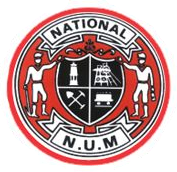Related Research Articles

The Scottish Trades Union Congress (STUC) is the national trade union centre in Scotland. With 40 affiliated unions as of 2020, the STUC represents over 540,000 trade unionists.
In British politics, an affiliated trade union is one that is linked to the Labour Party. The party was created by the trade unions and socialist societies in 1900 as the Labour Representation Committee and the unions have retained close institutional links with it.

The Transport and General Workers' Union was one of the largest general trade unions in the United Kingdom and Ireland – where it was known as the Amalgamated Transport and General Workers' Union (ATGWU) to differentiate itself from the Irish Transport and General Workers' Union – with 900,000 members. It was founded in 1922 and Ernest Bevin served as its first general secretary.

The National Union of Mineworkers (NUM) is a trade union for coal miners in Great Britain, formed in 1945 from the Miners' Federation of Great Britain (MFGB). The NUM took part in three national miners' strikes, in 1972, 1974 and 1984–85. After the 1984–85 strike and the subsequent closure of most of Britain's coal mines, it became a much smaller union. It had around 170,000 members when Arthur Scargill became leader in 1981, a figure which had fallen in 2015 to an active membership of around 100.

The National Union of Rail, Maritime and Transport Workers is a British trade union covering the transport sector. It is currently presided by Michelle Rodgers and its current general secretary is Mick Cash.

The National Union of Seamen (NUS) was the principal trade union of merchant seafarers in the United Kingdom from the late 1880s to 1990. In 1990, the union amalgamated with the National Union of Railwaymen to form the National Union of Rail, Maritime and Transport Workers (RMT).
The National Transport Workers' Federation (NTWF) was an association of British trade unions. It was formed in 1910 to co-ordinate the activities of various organisations catering for dockers, seamen, tramwaymen and road transport workers.
The Dock, Wharf, Riverside and General Labourers Union (DWRGLU), often known as the Dockers' Union, was a British trade union representing dock workers in the United Kingdom.
The Workers' Union was a general union based in the United Kingdom, but with some branches in other countries. During the 1910s, it was the largest general union in the UK, but it entered a rapid decline in the 1920s, and eventually became part of the Transport and General Workers' Union (TGWU).
The 1890 Australian maritime dispute was an industrial dispute that began on 15 August 1890 when the Mercantile Marine Officers' Association directed its members to give 24 hours' notice to their employers after negotiations broke down with the Steamship Owners' Association of Victoria over longstanding pay and conditions claims. Industrial action quickly spread to seamen, wharf labourers, then gas stockers. Coal miners from Newcastle, Broken Hill, and even New Zealand were locked out after refusing to dig coal for non-union operated vessels. By September 1890, 28,500 workers were on strike.

The Queensland Council of Unions (QCU) is a representative, peak body of Queensland trade union organisations, also known as a labour council, in the Queensland, Australia. As of 2020, 26 unions and 13 regional branches were affiliated with the QCU. The QCU represents unions covering around 350,000 Queensland workers. It is affiliated with the Australian Council of Trade Unions (ACTU). Its offices are located in the suburb of South Brisbane, Queensland. As a peak body for the Queensland trade unions, the objective of the QCU is to achieve industrial, social and political justice for Queensland workers. The management structure of the QCU is made up of a committee of management and an executive of representatives comprised from affiliated unions.

The Irish Transport and General Workers Union (ITGWU), was a trade union representing workers, initially mainly labourers, in Ireland.

Robert Williams was a British trade union organiser.
The Miners' Federation of Great Britain (MFGB) was established after a meeting of local mining trade unions in Newport, Wales in 1888. The federation was formed to represent and co-ordinate the affairs of local and regional miners' unions in England, Scotland and Wales whose associations remained largely autonomous. At its peak, the federation represented nearly one million workers. It was reorganised into the National Union of Mineworkers in 1945.

The Monmouthshire and South Wales Coal Owners' Association (MSWCOA) was an association of mine owners in South Wales that was active between 1873 and 1955. It fought wage increases, safety regulations, unionisation and other changes that would cut into profits. It managed to link miners wages, which were based on piece-work, to the price of coal. It was involved in various labour disputes, including a lengthy strike in 1926. The coal mines became unprofitable in the 1930s and were nationalized in 1947, making the association irrelevant.
The history of trade unions in the United Kingdom covers British trade union organisation, activity, ideas, politics, and impact, from the early 19th century to the present.
William Devenay was a British trade unionist and politician.
John Davies was a Welsh politician and trade unionist, who served as Mayor of Merthyr.
References
- 1 2 3 "Volume Three - The Pontoon Era - The seamen's pay strike of 1911". The History of the Penarth Dock and Ely Tidal Harbour in South Wales. Retrieved 6 January 2020.
- ↑ Jenkins, David (2013). Shipowners of Cardiff: A Class by Themselves. Cardiff: University of Wales Press. pp. 16–18. ISBN 1783160160.
- ↑ Stevens, Christopher (2013). "A life of public service, the career of Benjamin Owen Davies, 1866-1958" (PDF). Cleveland History (104): 3–22. Retrieved 6 January 2020.
- ↑ Carter, Pete; Smethurst, John B. (2013). Historical Directory of British Trades Unions. 6. Ashgate. p. 148. ISBN 1409480313.
- ↑ Labour Party, Report of the Executive Committee (1918), pp.115